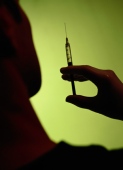- Could Artificial Sweeteners Be Aging the Brain Faster?
- Techniques for Soothing Your Nervous System
- Does the Water in Your House Smell Funny? Here’s Why
- Can a Daily Dose of Apple Cider Vinegar Actually Aid Weight Loss?
- 6 Health Beverages That Can Actually Spike Your Blood Sugar
- Treatment Options for Social Anxiety Disorder
- Understanding the Connection Between Anxiety and Depression
- How Daily Prunes Can Influence Cholesterol and Inflammation
- When to Take B12 for Better Absorption and Energy
- Epsom Salts: Health Benefits and Uses
New Drug Class Slashes ‘Bad’ Cholesterol, Review Finds


A new class of cholesterol drug could sharply cut “bad” LDL cholesterol in people who don’t fare well on commonly used cholesterol-lowering medications called statins, a new research review confirms.
The drugs, known as PCSK9 inhibitors, are not on the market yet. But the U.S. Food and Drug Administration (FDA) is expected to decide later this year on the first two medications in the class: evolocumab (Repatha) and alirocumab (Praluent).
The review of 24 clinical trials found that PCSK9 inhibitors lowered people’s LDL cholesterol by about 47 percent, on average.
More important, the drugs seemed to cut the risk of heart attack or death from heart disease, according to the researchers.
Experts did urge some caution, however: Trials so far have been short-term, and it’s not clear whether the new cholesterol drugs really do extend people’s lives, according to Dr. Seth Martin, a cardiologist at Johns Hopkins University in Baltimore.
“Still, the early data are exciting, and we’re cautiously optimistic,” said Martin, who co-wrote an editorial published with the study.
The study was published online April 28 in the Annals of Internal Medicine.
Statin drugs have long been the go-to treatment for lowering LDL cholesterol, according to background information in the study. Studies have proven they can help prevent heart attacks, strokes and other cardiovascular complications.
But for some people, statins cause intolerable muscle pain. “Those people would be obvious candidates for PCSK9 inhibitors,” Martin said.
For others, statins just don’t do the job — including people with an inherited condition called familial hypercholesterolemia, which causes very high LDL levels and heart attacks at an early age. That’s another group that could benefit from the new drugs, Martin said.
“Familial hypercholesterolemia is not rare,” he noted. “It affects about one in 300 to 500 people.”
Of the trials in the current review, half involved people with familial hypercholesterolemia. Some of the others focused on people who’d dropped statins because of side effects.
PCSK9 inhibitors work by blocking a protein in the liver that helps regulate LDL, according to the study. The new drugs don’t appear to cause the muscle woes that statins can.
However, that doesn’t mean they’re completely safe. Martin said the main concern that has arisen in trials is the potential for “neurocognitive effects.” For example, some study patients have reported problems such as confusion and trouble paying attention. But, Martin said, it’s not clear yet whether the PCSK9 inhibitors are actually the cause.
The issue, he added, “is getting close attention from the FDA. So that’s reassuring.”
For the review, researchers led by Dr. Eliano Navarese, of Heinrich Heine University in Dusseldorf, Germany, pooled the results of 24 clinical trials involving over 10,000 patients. Some compared a PCSK9 inhibitor to a placebo (inactive treatment), while others used the cholesterol drug ezetimibe (Zetia) for comparison.
Overall, the researchers found, the new drugs cut LDL to a greater degree. They also lowered patients’ risk of heart attack or death by about half.
The caveat, Martin stressed, is that the studies were short, and few people suffered complications. He said longer-term studies are needed to prove that the drugs prevent heart attacks and extend people’s lives — without serious side effects.
Dr. Suzanne Steinbaum, a preventive cardiologist at Lenox Hill Hospital in New York City, agreed that the results so far are encouraging.
“For all those patients unable to take statins, finally there might be an option that can change (their) outcomes,” said Steinbaum, who was not involved in the review.
But, she added, “we need to patiently wait for the next phase of trials to see whether the clinical outcomes are as promising as the initial studies suggest.”
If PCSK9 inhibitors are approved, some real-world obstacles remain.
For one, the drugs have to be self-injected, which might put some people off. On the other hand, Martin said, the injections are done only once a month or every couple of weeks.
“Some people may prefer that to taking a pill every day,” he said.
And then there’s the cost. PCSK9 inhibitors are specialty drugs known as monoclonal antibodies, which are lab-altered versions of human antibodies. And they are not cheap.
The cholesterol drugs could cost up to $12,000 a year per patient, according to a recent estimate by CVS Health, one of nation’s largest pharmacy benefit managers.
Since so many Americans take cholesterol drugs — for years or even decades — CVS warned that the cost to the health care system could be sky-high.
More information
The American Heart Association has more on treating high cholesterol.
Source: HealthDay
Copyright © 2026 HealthDay. All rights reserved.










